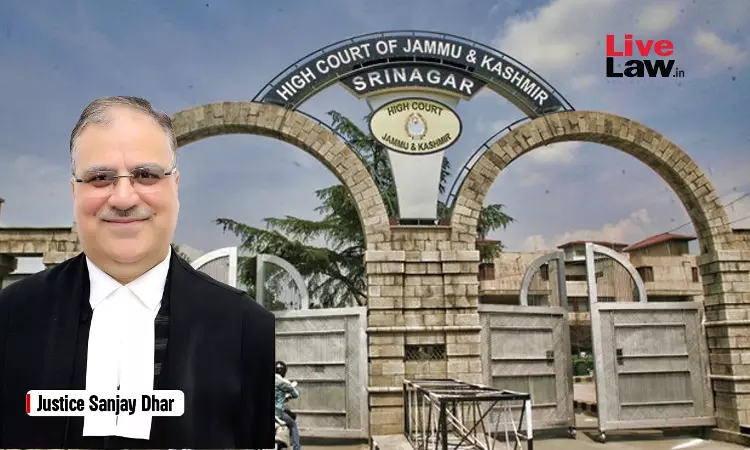- Home
- /
- High Courts
- /
- High Court of J & K and Ladakh
- /
- Statement Of Child Victims...
Statement Of Child Victims Susceptible In Imposing Atmosphere Of Courtroom: J&K HC Upholds Man's Sentence For Sexually Assaulting 4-Yr-Old
LIVELAW NEWS NETWORK
24 April 2025 6:05 PM IST
The Jammu and Kashmir & Ladakh High Court has underscored the inherent vulnerability of child witnesses in courtroom settings while upholding the conviction of Dinesh Kumar for sexually assaulting a minor girl in Leh in the year 2017.Justice Sanjay Dhar dismissed the appeal, affirming an 8-year rigorous imprisonment sentence under Section 376 of the Ranbir Penal Code (RPC), and...
The Jammu and Kashmir & Ladakh High Court has underscored the inherent vulnerability of child witnesses in courtroom settings while upholding the conviction of Dinesh Kumar for sexually assaulting a minor girl in Leh in the year 2017.
Justice Sanjay Dhar dismissed the appeal, affirming an 8-year rigorous imprisonment sentence under Section 376 of the Ranbir Penal Code (RPC), and emphasized that a child's testimony must be evaluated with sensitivity to their age and the intimidating atmosphere of legal proceedings.
“.. with regard to assessment of statement made by a child witness, it is clear that a Court has to take into account the fact that a child witness is vulnerable and susceptible under imposing atmosphere which a courtroom presents”, the court remarked.
The case arose when the Lamberdar (village head) reported an attempted rape of a minor girl by a laborer, later identified as Dinesh Kumar. The police registered FIR under Sections 376 (rape) and 511 (attempt) RPC. Medical examination revealed injuries consistent with sexual assault, including bite marks on the victim's face, cuts on her vulva, and inflammation. The victim, referred to as "Miss X" in court documents, identified the assailant as "Dilliwala Uncle" (Delhi man).
Kumar was arrested and charged under Sections 376 and 323 (voluntarily causing hurt) RPC. The trial court convicted him in 2019, sentencing him to 8 years for rape and 3 months for assault. Kumar appealed, challenging the conviction on grounds of flawed evidence, lack of medical proof of intercourse, and alleged false implication due to prior enmity with the victim's family.
Highlighting the child witness reliability, Justice Dhar relied on State v. Suject Kumar (2014 SCC Online Del 1952) to highlight the UN Guidelines on Justice for Child Witnesses, noting that children face unique trauma in courtrooms. The victim, aged four at the time of the incident and six during testimony, described the assault as a "dirty act" but could not detail the specifics like an adult, the court pointed.
“.. It is to be noted that at the time when the statement of the victim in the present case was recorded, there were no vulnerable witness deposition facilities available in this part of the country… Therefore, the victim must have deposed before the trial court in the same atmosphere as an adult witness disposes before the court. She must have also faced the imposing personality of the appellant/accused at the time of her deposition”, highlighted Justice Dhar.
He added, “In these circumstances, the fact that the victim girl in her cross examinations, has stated that the appellant had only touched her private part and not done anything else, may not be of much consequence, because in her examination in chief, she has clearly stated that the appellant did dirty act on her private part with his finger which resulted in pain to her”
Pointing out the medical evidence corroboration, the court observed that the gynecologist who examined the victim, testified to injuries on her private parts, foul-smelling vaginal discharge, and painful urination consistent with digital penetration. The absence of spermatozoa did not negate the assault, as Section 375 RPC (rape) covers any form of non-consensual penetration, the court stated.
Addressing a key contention was that the trial court's charge sheet described an "attempt to rape" (Section 511 RPC) but convicted Kumar under Section 376 RPC (rape), Justice Dhar examined this under Section 215 of the J&K CrPC (akin to Section 215 of the Central CrPC) and observed that an error in stating the offence or its particulars is not material unless it misleads the accused and causes a failure of justice.
Observing that no prejudice was caused because Kumar was aware he was being tried for rape (Section 376 RPC) the court stated that he never objected to the charge framing during the trial.
“The record clearly shows that the appellant was all along aware of the fact that he was being tried for offence of rape and not for offence of attempt to rape, as such, it cannot be stated that the appellant was subjected to any prejudice while making his defence to the charge for which he was being tried”, the court remarked.
Thus the appeal came to be dismissed.
Case Title: Dinesh Kumar Vs UT Of Leh
Citation: 2025 LiveLaw (JKL) 161

